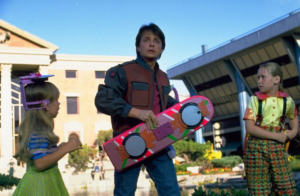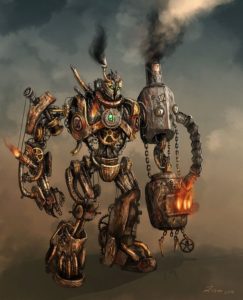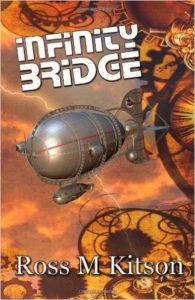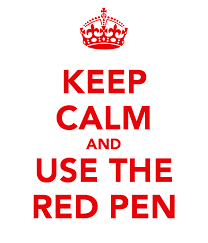It’s one of those givens for ‘bright new thing’ bands that after stunning debut albums, the second album never quite lives up to expectations. I’m sure everyone will throw out their exceptions, but for me The Killers, The Stone Roses, The Enemy, Mumford and Sons, and the Fratellis I can recall the deflation at listening to the eagerly anticipated second releases.
 And films can often suffer the same issues, especially when not being planned as a series. Although loved by hard-core fans, I struggled to love Back to the Future 2 after worshiping the first; Hannibal was a poor shadow of Silence of the Lambs; Matrix Reloaded was best left without loading, and sometimes the third and beyond disappoint (Phantom Menace, Batman and Robin, Indiana Jones and the Crystal Skull thingy).
And films can often suffer the same issues, especially when not being planned as a series. Although loved by hard-core fans, I struggled to love Back to the Future 2 after worshiping the first; Hannibal was a poor shadow of Silence of the Lambs; Matrix Reloaded was best left without loading, and sometimes the third and beyond disappoint (Phantom Menace, Batman and Robin, Indiana Jones and the Crystal Skull thingy).
As a fledgling author, I can feel the pain of sequels. The first offering, especially in music, is often a synthesis of years on the road, eliminating crap songs, finding what works and what doesn’t, and the evolution of a fresh voice, a fresh way of displaying your art. We go through a similar process ourselves as writers, albeit on a more individual scale. We begin with scribbling, brainstorming narratives and styles, taking critique and refining. Some of us write short stories, dabble in genres, until we find one that suits our written ‘voice.’ And then, for some of us, that’s enough to write something more ambitious—a novella, or a novel.
I cut my teeth on fantasy fiction, first of all writing a piece based on Role-Playing Games for friends, then short stories for an on-line fanzine. The latter was critiqued by other authors, sometimes unfairly, but usually constructively, until it passed the ‘publishing’ test. Finally I worked up the bravery to write a fantasy novel, which evolve into a six book series (from a planned long single volume, similar to Stephen’s Epic Fantasy with Dragons).
The latter was critiqued by other authors, sometimes unfairly, but usually constructively, until it passed the ‘publishing’ test. Finally I worked up the bravery to write a fantasy novel, which evolve into a six book series (from a planned long single volume, similar to Stephen’s Epic Fantasy with Dragons).
In the midst of the six book Darkness Rising series, my kids nagged me into writing something lighter and more sci-fi based. Being fervent Dr Who fans (the term Whovian still rankles a little for me), I put a lot of alternate reality, televisual action into it and the kids loved it. It took a few rewrites and jiggles, but end-product—the Infinity Bridge—is probably by favourite single thing I’ve written. Naturally, the kids want more. And, indeed, having put the book up on Wattpad (the international Empire of Shaun Allen, as it shall be forever known ** proud colleague moment**) and reviewed on Goodreads, it seems there are readers not just loyal to me because I control their allowance who want to read some more of the ‘Nu Knights.’
Wattpad (the international Empire of Shaun Allen, as it shall be forever known ** proud colleague moment**) and reviewed on Goodreads, it seems there are readers not just loyal to me because I control their allowance who want to read some more of the ‘Nu Knights.’
And there the difficulty began. Although I’d written Infinity Bridge as having the potential for a series, the book is still fairly standalone. The events that occur in it, and how would they pan out in the course of time, were never fully fleshed out for a whole ongoing series. Not long after I published it, I had some great ideas for plots, and especially sub-plots of where I could take the characters, and began furiously typing these down. And as they hit the virtual page more ideas arrived, and evolved, and story arcs, and set-ups for books 3 and 4, and…
Boom. It’s written, and it all ties together in my brain, and I think ‘hot diggety, it’s ready to go.’ And then my steampunk mentor reads it, and says… ohhh—kayyyy, see what you’re doing here, but it’s like you’ve tried to do a dinner party for ten, including a vegan and someone who’s gluten intolerant, and served starters, main and dessert on one huge plate. That’s my analogy by the way, hers are far more exquisite. Too many ideas, too many characters, in too confusing a plot.
Now I’m embarrassed to say, that beyond a few paragraphs, and extra material to flesh a sub-plot out, I’ve never actually rewritten any of my work. As in never done first draft, second draft/ revision etc. Largely this was because I kind of actually just wrote as a hobby, mainly not really caring who read it, and with no expectation or precedent. Also, in a rather childish way, I get the buzz from that initial flurry of plotting, evolving the narrative and plot as I go along. It worked for Ian Fleming, why not me? So to tackle this rough diamond I have created, and refine and polish it until it’s worth putting on display is new territory for me. And I’m simply not sure how to do it—but then, when I evolved from short stories to novels I wasn’t either, and learned the best way—by others experience and mistakes, and by becoming part of a collective of like-minded motivated (and, honestly, more talented) writers.
Stephen King’s advice to new writers was to first and foremost be a reader—to digest everything on offer, in as many genres and styles as you can. In doing that you become acutely aware that some mainstream authors, usually riding on their success, have fallen into the trap of not refining their diamonds. I read some books and want to get a red pen and slash through the padding and indulgence that even top authors (and I’m thinking of George RR Martin especially here) put in their weighty tomes. And I hope it’s a sign of my progress of a writer that it’s time to do so to myself.
Nu Knights 2: The Spectral Assassin will be out this year.
